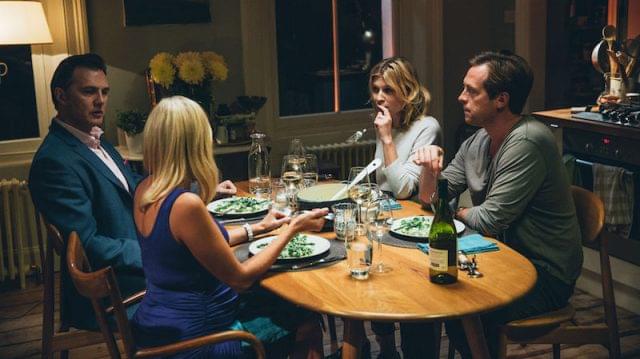
For all its miraculous beauty, there is also something eerie and alien about pregnancy, even when you know how the baby got there and how it’s going to get out. Films have exploited the fears of expectant parents for as long as movies have been allowed to say the word “pregnant” (so, like, the ’50s), so there isn’t much new ground to be explored. But “The Ones Below,” a taut thriller from first-time British filmmaker David Farr, covers some of the familiar fears with a cold, unsettling efficiency.
This is a roundabout way of saying that there should a Surgeon General’s warning on this film: Do not watch this movie if you are pregnant or expecting to become pregnant, ever.
Kate (Clemence Poesy) and Justin (Stephen Campbell Moore) are a comfortable white-collar couple in suburban London who are expecting their first baby in a few months. They live in the upstairs portion of a spacious duplex; below are new neighbors, just moved in, who are equally pregnant. Theresa (Laura Birn) is Finnish, gorgeous, and very open about her body. Her husband, Jon (David Morrissey), is several years older, imposing, somber. As a couple, they are almost unnervingly intense about their desire to have a child. It is impossible to observe them and their mannerisms and not think: What’s the deal with these two?
Nonetheless, Kate and Theresa bond over their shared delicate condition until there is shocking incident, followed by a ferocious argument, that divides the two couples. (The searing drama on display in these scenes is palpable.) The downstairs neighbors move out. Time passes, and Kate and Justin’s baby is born. It seems like everything will be OK. But will it? (It will not.)
Farr, a TV scribe making his directorial debut (he also co-wrote “Hanna”), gets sidetracked by a handful of details that turn into loose ends — Kate’s mother (Deborah Findlay) is weirdly aloof; there’s a repetition of sexual imagery that doesn’t add up to anything — but he handles the meat of the story effectively, playing on the worries that afflict all new parents. He makes shrewd use of the accoutrements of parenthood, like baby monitors, milk bottles, and sleep deprivation, and Poesy and Moore are fine as frazzled, dedicated parents.
The fears that Farr preys upon include both rational and irrational ones — and of course, part of the suspense in a movie like this comes from not knowing which category each concern belongs to. Farr deliberately reveals some information that partially settles the question, and the film might have been better if he’d limited himself to Kate’s point of view, letting us, like her, wonder how much she’s imagining or misinterpreting. But plenty remains hidden, too, right up to the chilling final moments. This isn’t one of those scary stories meant as cautionary tales. It’s just meant to make you nervous. Have fun!
B (1 hr., 26 min.; )





